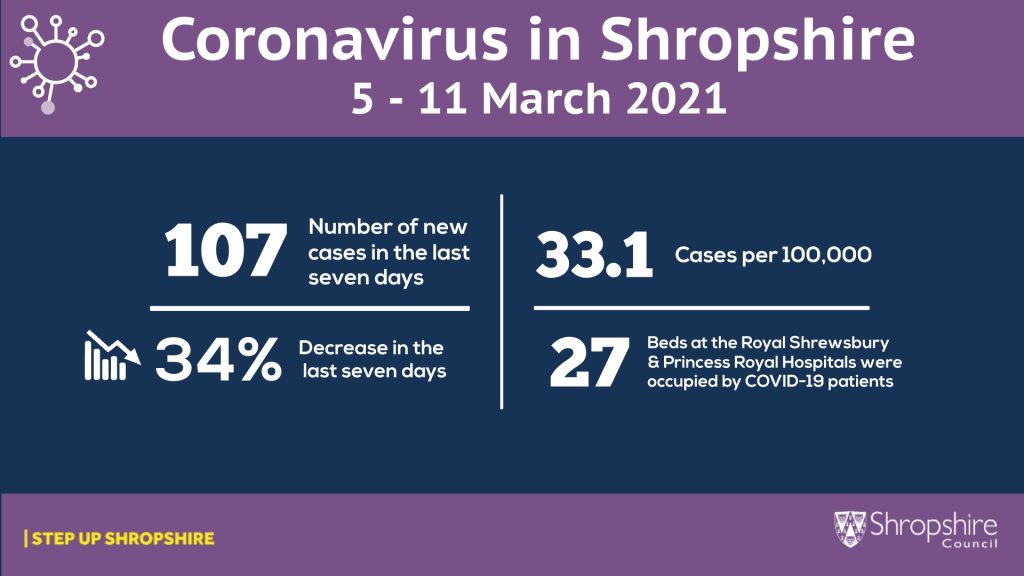Coronavirus: COVID-19 cases continue to decline in Shropshire
During the 7-day period between 5-11 March 2021:-
- 107 new cases reported
- This was a decrease of 54 cases (34%) compared to the previous week
- The seven-day infection rate for Shropshire was 33.1 cases of COVID-19 per 100,000 of the population.
- For the West Midlands it was 66.6 per 100,000
- For England it was 58.3 per 100,000
- 27 hospital beds at the Royal Shrewsbury and Princess Royal Hospitals were occupied by COVID-19 patients
- 32 cases relate to people under the age of 30
- 5 cases relate to people aged 70+
- During the last week 34% of cases were in the Shrewsbury & Atcham area
- 47% were in north Shropshire
- 19% were in south Shropshire

Rachel Robinson, Shropshire Council’s director of public health, said:
“The news about the continued falling number of infections, coupled with the rising number of people getting their vaccinations, is rightly giving us all a sense of optimism after what has been a challenging few months.
“I liken our current situation to being 1-0 up in a football match. We are comfortable and in control – the last thing we want to do now is get complacent and let our hard-fought lead slip.
“Everyone has worked so hard to get us to this point. I don’t want to dampen anyone’s optimism, but we really need everybody to continue to be sensible at this time.
“Over 200,000 people have now received their vaccinations locally, but we cannot get complacent or let our guard down. People who have had a vaccine may still carry coronavirus and unintentionally pass it on to friends, family or work colleagues, so it is crucial that we continue to follow all measures to control the spread of the virus.
“We must all continue to follow the latest advice and guidance about regular handwashing, wearing a face covering, maintaining social distancing, and only going out if essential. In the past, we have seen how quickly cases can rise once restrictions are eased. If we want to move back to some ‘normality’ as quickly as possible, it is vital that everyone follows the rules.
“People should still self-isolate if they have been in contact with anyone with COVID-19 symptoms or have tested positive, even if they have had a vaccine themselves. It is also vital that people continue to take the opportunity to get regular tests.
“Routine testing means we can monitor the spread of the disease and spot any new virus variants before they become more prevalent in our communities. This is particularly important in workplaces, but matters in the wider community too. If people aren’t getting tested, we cannot identify new outbreaks or patterns, so we must all play our part.”
Rapid home test kit collection
Twice-weekly testing using rapid Lateral Flow Tests will be made available for free to all adults in households with primary school, secondary school and college-aged children for those without symptoms.
This includes adults in childcare and support bubbles, and twice-weekly testing will also be offered to adults working in the wider school community, including bus drivers, taxi drivers and after school club leaders.
These tests are available for collection at the following sites:

Tests can be ordered either for collection or home delivery online here.
Step Up and help us stop the spread of coronavirus:
- Stay At Home
- Work from home, if you can
- Wash your hands regularly with soap and water for at least 20 seconds
- Do not leave home if you or anyone in your household has symptoms
- Wear a face covering in indoor settings (food shops, workplaces) where social distancing may be more difficult, and where you may come close to people who are not part of your household or bubble.
- Anyone who has any symptoms should book a test and not leave home for at least 10 days. Those living in households should self-isolate for 10 days if they or any members of the household receive a positive test.
For local advice and support during the pandemic (especially if you are self-isolating), call Shropshire Council’s COVID-19 Helpline on 0345 678 9028 or visit our website at www.shropshire.gov.uk/coronavirus.

